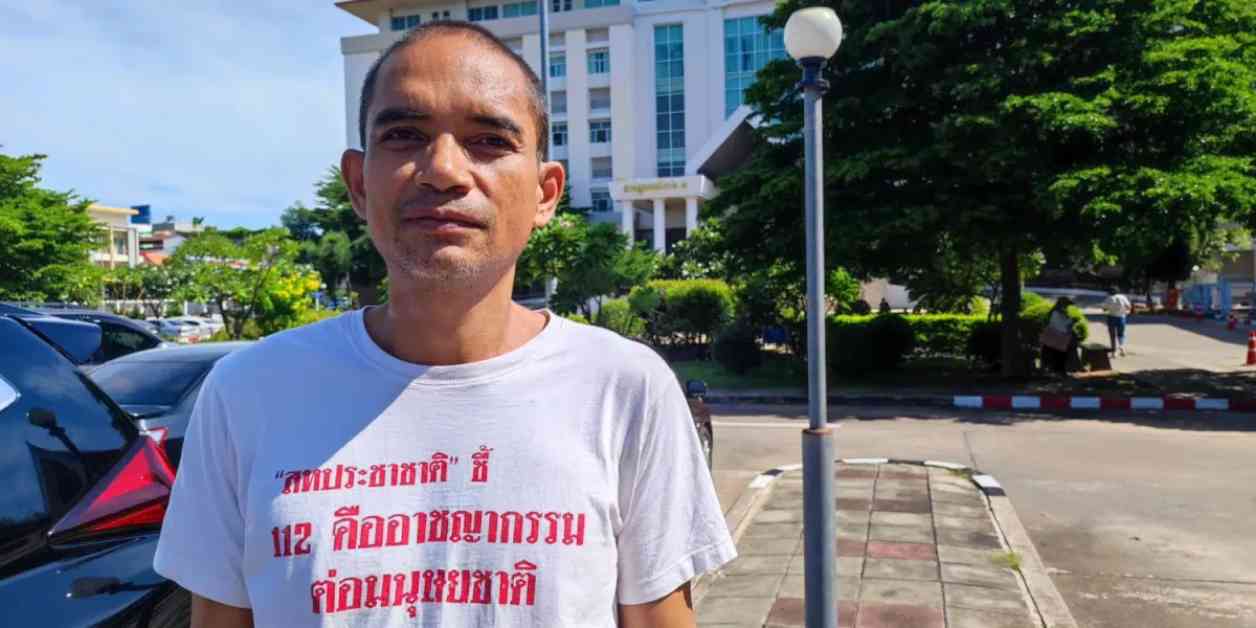The Appeal Court’s Decision on Royal Defamation in the “Lost Faith Shirt” Case
In a controversial ruling, the Appeal Court has reversed the dismissal of a royal defamation charge against Tiwagorn Withiton, a 48-year-old man whose case gained widespread attention in 2020. Tiwagorn’s troubles began when a photo of him wearing a white t-shirt with the words “I have lost faith in the monarchy” went viral, sparking outrage among authorities in Thailand. The court has now sentenced him to 6 years in prison, sparking further debate and criticism over the country’s laws regarding lese majeste.
Tiwagorn’s Legal Battle and Arrests
Tiwagorn Withiton’s legal troubles started in July 2020 when he was arrested and forcibly admitted to Khon Kaen Rajanagarindra Psychiatric Hospital after posting the controversial photo of himself in the “Lost Faith Shirt.” He was eventually discharged on 22 July 2020 following a public campaign for his release. However, his ordeal was far from over as he was arrested again on 4 March 2021 for Facebook posts made in February of that year.
Initially, Tiwagorn was charged with royal defamation, sedition, and violation of the Computer Crimes Act for his online activities. Despite the initial dismissal of the charges by the Khon Kaen Provincial Court in September 2022, the Appeal Court has now found him guilty of royal defamation and violation of the Computer Crimes Act. The court ruled that Tiwagorn intended to defame the King by wearing the shirt and promoting its sale, as well as allowing defamatory comments about the monarch on his social media posts.
The Appeal Court’s Verdict and Sentencing
The Appeal Court’s ruling sentenced Tiwagorn to 9 years in prison, which was later reduced to 6 years due to the defendant’s cooperation and helpful evidence in the case. While he was found guilty of royal defamation and violating the Computer Crimes Act, he was acquitted of sedition charges due to lack of evidence of inciting illegal activities. Tiwagorn’s decision to forgo bail means he is currently detained at the Khon Kaen Special Correctional Institution pending appeal with the Supreme Court.
With Tiwagorn’s detention, the number of individuals held on royal defamation charges awaiting trial or appeal has now risen to 17, highlighting the ongoing crackdown on dissent and criticism of the monarchy in Thailand. The case has sparked concerns among human rights activists and legal experts regarding the use of lese majeste laws to stifle freedom of expression and dissent in the country.
Security Measures and Observations at the Trial
During the trial at the Khon Kaen Provincial Court, tight security measures were in place to prevent any disruptions or unauthorized activities. Observers entering the courtroom had their ID cards scanned, bags searched, and were reminded to keep their phones in their bags. Court officials closely monitored the proceedings, ensuring that decorum was maintained throughout the trial.
The presence of heightened security and surveillance during the trial raised concerns about transparency and fairness in the judicial process, with critics pointing to the restrictive atmosphere as a means to intimidate observers and limit public scrutiny of the proceedings. The need for transparency and accountability in legal proceedings involving sensitive issues such as royal defamation is crucial to upholding the rule of law and protecting individuals’ rights to a fair trial.
Implications of the Appeal Court’s Decision
The Appeal Court’s decision to reverse the dismissal of the royal defamation charge against Tiwagorn Withiton has significant implications for freedom of expression and the right to dissent in Thailand. The ruling sets a dangerous precedent for individuals expressing critical views of the monarchy, signaling a clampdown on any form of criticism or questioning of royal authority.
The case highlights the challenges faced by individuals speaking out against the monarchy in a climate of political repression and censorship. The use of lese majeste laws to suppress dissent and silence critics raises concerns about the erosion of democratic values and fundamental rights in Thailand. The need for legal reform and protection of freedom of expression is crucial to safeguarding individuals’ rights and promoting a more open and inclusive society.
Moving Forward: Calls for Legal Reform and Human Rights Protections
The case of Tiwagorn Withiton and the Appeal Court’s ruling on his royal defamation charge underscore the need for legal reform and protection of human rights in Thailand. The use of draconian laws to silence dissent and restrict freedom of expression undermines the country’s democratic principles and stifles societal progress.
Human rights organizations and activists have called for the repeal of lese majeste laws and other repressive measures that curtail freedom of speech and peaceful assembly. The protection of individuals’ rights to express their opinions and engage in political discourse is essential for a vibrant and democratic society.
As the case of Tiwagorn Withiton continues to unfold, it serves as a stark reminder of the challenges faced by individuals standing up for their beliefs and advocating for change in an environment of political repression and censorship. The need for legal reform and respect for human rights is paramount to ensuring justice, equality, and freedom for all individuals in Thailand and around the world.




















